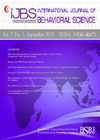strategies to Prevent Drug Abuse among Primary School Students
Main Article Content
Abstract
This participatory action research aimed to develop strategies for drug prevention, which were specific to students’ life style and social contexts. The focus of this research was on providing knowledge and developing appropriate attitudes about drug abuse and essential skills for drug abuse prevention. One hundred and thirty three students in one primary school in the North-eastern part of Thailand were selected through purposive sampling. Data was collected using demographic data sheets and questionnaires to determine knowledge, attitude and drug addiction prevention practices. The study revealed that primary school students, under teacher supervision, were able to create and maintain a campaign against drug abuse for a period of three months. Campaign activities included 1) providing health education by a variety of means such as radio, video, essays, poetry, drawing competitions, poster presentations, songs, exhibitions, and parades and 2) organizing events such as concerts, role playing, singing and dancing contest. Paired t test was used to determine the difference in knowledge, attitude, and drug abuse prevention score of primary school students before and after participation in this study. Results showed that there were statistically significant differences, at p < 0.05, in the average knowledge, attitude, and drug addiction prevention practices among the sample. The research findings revealed that participation raised the student’s awareness of drug abuse prevention.


